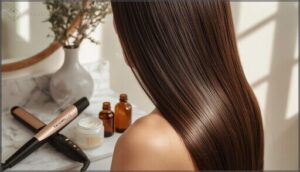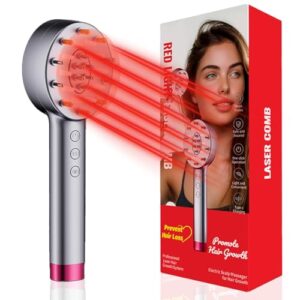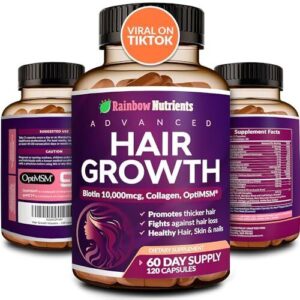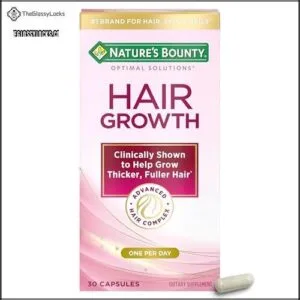This site is supported by our readers. We may earn a commission, at no cost to you, if you purchase through links.
Your bathroom mirror doesn’t lie, but your perception about winter hair growth might. While you bundle up in scarves and watch snowflakes fall, you might notice your hair seems thicker, longer, or healthier during the colder months, leading to the persistent belief that hair grows faster in winter.
The truth is more nuanced than folklore suggests, rooted in the biological mechanisms that govern your hair follicles year-round, specifically the anagen, catagen, and telogen phases that determine growth rates regardless of temperature. Cold air and indoor heating create conditions that affect how your hair looks and feels, influencing breakage patterns and moisture retention in ways that can trick you into thinking growth has accelerated.
Understanding what drives hair growth and what winter conditions mask or reveal helps you separate seasonal illusions from the science that dictates how fast your strands actually lengthen.
Table Of Contents
- Key Takeaways
- Hair Growth Cycles Explained
- Factors That Influence Hair Growth
- Winter’s Impact on Hair and Scalp
- The Science Behind Seasonal Hair Growth
- Common Winter Hair Problems
- Myths About Faster Winter Hair Growth
- Protective Winter Hair Care Routines
- Nutrition’s Role in Winter Hair Health
- Top 5 Products for Winter Hair Growth
- Tips to Maintain Healthy Hair in Winter
- Frequently Asked Questions (FAQs)
- Why does my hair grow so fast in winter?
- What season does hair grow the fastest?
- Does winter increase hair growth?
- How fast does hair grow in the winter?
- Does hair grow faster in the winter for everyone?
- Does cold weather make a difference in hair growth?
- Is there a way to speed up hair growth in winter?
- Are there any risks to using hair-care products in winter?
- Is it important to adjust my diet for hair growth in winter?
- Can winter weather cause temporary hair loss?
- Conclusion
Key Takeaways
- Your hair doesn’t actually grow faster in winter—it maintains a consistent monthly rate of 0.5 to 1.7 centimeters year-round, controlled by genetically programmed follicle cycles (anagen, catagen, and telogen phases) that don’t respond to seasonal temperature changes.
- Winter’s cold air and indoor heating strip moisture from your hair and scalp, creating dryness, brittleness, increased breakage, and static electricity that make your hair appear thinner or damaged, not because growth has slowed but because environmental conditions compromise strand integrity.
- The perception that hair grows faster in winter stems from reduced shedding visibility and better length retention when you use protective styles, not from any actual acceleration of the hair growth cycle, which remains governed by genetics, age, hormones, and nutrition regardless of season.
- Maintaining healthy hair through winter requires moisture-focused strategies including sulfate-free cleansers, deep conditioning treatments, protective hairstyles that minimize friction, reduced heat styling, and nutritional support through adequate protein, iron, zinc, biotin, and hydration to counteract environmental stressors.
Hair Growth Cycles Explained
Before you can understand whether winter affects your hair growth, you need to know how hair actually grows in the first place. Your hair doesn’t grow continuously like a plant—it moves through distinct biological phases that determine how long each strand gets and when it eventually falls out.
Let’s break down these three critical phases, the typical growth rates you can expect, and what percentage of your hair is actively growing at any given moment.
Anagen, Catagen, and Telogen Phases
Your hair follicle cycles through three distinct phases that determine how your hair grows and sheds. Understanding this growth cycle gives you control over what’s actually happening on your scalp.
Just like your scalp needs the right care for its growth phases, your skin’s changing needs call for affordable hydrating moisturizers that work within any budget.
- Anagen phase – Active cell regeneration builds your hair shaft for 2 to 7 years
- Catagen phase – Intermediate period lasts 2 to 3 weeks as growth stops
- Telogen phase – Resting stage spans 3 to 4 months before hair shedding occurs
- Phase duration – About 85 to 90 percent of your scalp hairs stay in anagen at any time
You can gain deeper insight into each stage by reviewing this detailed guide to the.
Average Monthly Hair Growth Rates
Your scalp produces new hair at a monthly rate of 0.5 to 1.7 centimeters under typical conditions, translating to roughly 0.02 centimeters of daily growth.
Seasonal changes and monthly variations don’t substantially alter this pace, because your anagen phase and telogen phase follow consistent biological timing regardless of weather.
Growth rate factors including genetics, age, and nutrition determine your actual hair length gains far more than temperature shifts. According to average monthly hair growth rates, individual differences such as ethnicity can also play a role.
Percentage of Hair in Each Phase
Understanding how your hair growth cycle distributes across phases gives you insight into why shedding happens even when follicles remain healthy. Hair Phase Dynamics show clear patterns:
- About 85 percent of your scalp hairs stay in the anagen phase at any moment
- Roughly 1 to 2 percent occupy the catagen phase during transformation
- Approximately 10 to 15 percent rest in the telogen phase concurrently
- Exogen Shedding Rates account for daily hair loss as strands release
- Growth Cycle Variations depend on your individual genetics and body region
These percentages explain why you naturally lose 50 to 100 hairs daily without experiencing noticeable thinning, because your anagen phase constantly generates replacement strands while your telogen phase releases older ones.
Factors That Influence Hair Growth
Your hair’s growth rate isn’t locked in by winter weather alone, as several biological and lifestyle factors exert far more control over how quickly your follicles produce new strands.
Genetics, age, hormonal shifts, nutritional status, and stress levels all play measurable roles in determining whether your hair thrives or stalls, regardless of the season outside your window.
Understanding these core influences helps you separate real growth blockers from seasonal myths, so let’s examine the key factors that actually govern your hair’s behavior.
Genetic Determinants
Your genes don’t just hand down eye color—they blueprint your hair’s entire growth story, from follicle development to the texture winding down your back.
Genetic variants in keratin and growth factor receptor genes dictate how long your anagen phase lasts, how thick each strand grows, and even how your follicles respond to hormones, with heritability patterns explaining why your hair echoes your family’s.
Age and Hormonal Changes
Time rewrites your hormonal blueprint, reshaping hair growth cycles with every passing decade.
Estrogen Levels plummet during Menopause Symptoms, thinning your scalp hair while androgens shift follicle sensitivity, and Thyroid Balance fluctuations alter texture and shedding patterns as you age.
Hormone Therapy can modify density, though results vary widely, because your hair biology and physiology respond uniquely to these hormonal influence on hair shifts that reshape hair health and appearance.
Nutrition and Lifestyle
Your dietary patterns and lifestyle choices control nutrient intake that reaches every follicle, influencing hair growth and overall hair health in measurable ways.
A balanced diet rich in protein, iron, zinc, and biotin strengthens strands while reducing shedding, and adequate hydration promotes scalp health by preventing dryness that leads to breakage, making healthy habits essential for ideal hair care.
Stress and Health Conditions
Chronic stress disrupts hormone balance by keeping cortisol elevated, which can trigger telogen effluvium and excessive hair shedding that damages hair follicle health and scalp health over time.
Mental wellness and effective stress management through coping mechanisms reduce health risks associated with prolonged tension, supporting consistent hair growth and overall hair health by stabilizing the physiological conditions your follicles need to thrive.
Winter’s Impact on Hair and Scalp
Winter doesn’t just challenge your comfort—it creates a hostile environment for your hair and scalp that can undermine months of careful growth.
Cold weather strips away the natural moisture barrier that keeps your strands flexible and resilient, while the artificial heat you rely on indoors compounds the damage in ways you mightn’t recognize. Understanding these specific environmental stressors will help you protect your hair from seasonal setbacks.
Cold Air and Moisture Loss
Cold air effects on your hair and scalp are more dramatic than you might realize, because winter’s low humidity strips moisture faster than your natural barrier can replace it. When outdoor air chills, absolute humidity drops, accelerating transepidermal water loss from your scalp and leaving hair strands brittle, frizzy, and vulnerable to breakage.
Winter’s low humidity strips moisture from your scalp faster than your body can replace it, leaving hair brittle and prone to breakage
- Moisture retention plummets as cold weather dries your cuticle layer, increasing static electricity and flyaway strands
- Hair hydration suffers when frequent cold exposure slows the rehydration rate between wash days
- Dry scalp care becomes critical because moisture loss triggers compensatory oil production, creating a slick yet dehydrated state
Effects of Indoor Heating
Your heating systems work against hair health by slashing indoor humidity to 20–30 percent, which accelerates moisture loss from your scalp and strands even faster than winter weather outside.
Dry air from furnaces disrupts humidity control, forcing your hair cuticle open and triggering breakage, while indoor pollution from gas heaters deposits irritants that compromise hair growth and overall hair care efforts despite thermal comfort indoors.
Static Electricity and Hair Breakage
Static electricity builds when friction from brushes and fabrics transfers electrons to your strands, giving each hair a negative charge that causes repulsion and frizz.
While dry winter air below 40 percent humidity accelerates this buildup by removing moisture that normally neutralizes electric charge and prevents hair breakage, making static prevention through humidity control essential for winter hair care and sustained hair growth.
The Science Behind Seasonal Hair Growth
You might assume that your hair follows the same rhythm as the seasons, growing faster when you’re bundled up against the cold.
The truth is more nuanced, involving blood flow, environmental damage, and what actually happens beneath your scalp during winter months. Let’s break down what the research shows about seasonal shifts in hair growth and separate the biological facts from the common misconceptions.
Blood Circulation Changes
Your scalp’s blood circulation shifts with the seasons, and that directly affects how well nutrients reach your hair follicles. Winter’s cold triggers vessel constriction in peripheral areas, reducing blood flow to the scalp and slowing the delivery of oxygen and nutrients that fuel the hair growth cycle.
Here’s how circulation patterns change:
- Cold temperatures cause blood vessels to narrow, prioritizing core organs over your scalp
- Reduced blood flow means fewer nutrients reach hair follicles during winter months
- Vasodilation effects in summer increase oxygen delivery, supporting faster growth
- Indoor heating doesn’t reverse the constriction caused by outdoor cold exposure
- Your hair biology and physiology respond to these seasonal circulation changes, though genetics still dominate growth rates
Sunlight Exposure and UV Damage
Beyond circulation, your winter escape from intense sunlight exposure actually protects your hair from photo damage and UV radiation that degrades hair pigment and keratin structure year-round.
Summer’s UVA and UVB rays oxidize proteins in your hair shaft, causing brittleness and color fade, while vitamin D synthesis requires minimal sun—making scalp protection with sunscreen benefits your hair health without sacrificing growth-supporting nutrients.
Scientific Evidence on Growth Rates
When you look at Growth Rate Studies and Hair Follicle Research across multiple populations, the data reveals that winter hair growth doesn’t spike beyond typical monthly ranges of 0.5 to 1.0 centimeter in healthy adults.
Seasonal Growth Patterns mainly drive shifts in hair shedding cycles and telogen timing rather than accelerating your intrinsic hair growth rates, despite widespread myths suggesting otherwise.
Common Winter Hair Problems
Winter doesn’t just slow down hair growth through reduced circulation—it creates a hostile environment that damages the hair you already have, making it harder to retain length and maintain healthy strands.
Cold air outside and heated air inside work together to strip moisture from your hair shaft and scalp, triggering a cascade of problems that can undermine your hair health goals. Understanding these common winter challenges gives you the knowledge to fight back and protect your hair during the harshest months of the year.
Dryness and Brittleness
Winter air strips moisture from your hair faster than you might expect, leaving strands vulnerable to snap and frizz. You’ll notice dryness and brittleness when your cuticle care routine falls short, compromising hair elasticity and moisture balance.
To achieve breakage reduction and frizz control, focus on:
- Using sulfate-free cleansers to preserve natural oils
- Applying humectant-rich conditioners for hair moisture
- Sealing strands with lightweight oils
- Detangling gently while damp
Increased Split Ends
Friction becomes your enemy when cold weather makes you layer up, and those hats, scarves, and high collars create mechanical stress that frays your ends faster than summer sun ever could. Split End Causes multiply when winter’s low humidity strips protective moisture, leaving your hair shaft vulnerable to fracture at the tips, while increased heat styling to combat static accelerates hair breakage and compounds hair damage through repeated thermal insult.
| Split End Cause | Winter Trigger |
|---|---|
| Weather exposure | Cold air dries strands, cuticles lift and crack |
| Heat damage | More blow-drying and flat-ironing for smoothness |
| Moisture loss | Indoor heating depletes natural oils rapidly |
| Mechanical stress | Hats and scarves create friction at ends |
| Chemical wear | Overwashing strips lipids, weakening tips |
Addressing Hair Breakage requires Dryness Remedies that restore moisture balance and support your hair growth cycle, because split ends interrupt the hair care and maintenance you’ve worked to establish, making hair damage prevention essential for Frizz Control and minimizing Hair Fracture before it derails your length goals entirely.
Scalp Flakiness and Itching
Your scalp rebels against winter’s harsh conditions by producing white or yellowish flakes that signal either dandruff or simple dehydration, both of which trigger persistent itching in about half of affected individuals. Flake Causes range from Malassezia fungus overgrowth to moisture loss from indoor heating, making targeted Dandruff Treatment and Scalp Soothing essential for Itch Relief.
- Use medicated shampoos containing zinc pyrithione or ketoconazole for scalp conditions linked to seborrheic dermatitis
- Increase humidity and apply hydrating scalp care products to combat dryness-related Flaking Prevention
- Avoid over-washing and harsh soaps that strip natural oils, worsening scalp health and triggering irritation
Myths About Faster Winter Hair Growth
You’ve probably heard people claim their hair grows faster in winter, but the truth isn’t that simple. While it may seem like your hair is thriving during colder months, what you’re experiencing often has more to do with perception than actual growth rates.
Let’s break down the most common myths and what’s really happening with your hair when temperatures drop.
Perceived Vs. Actual Growth
Your hair follicles don’t speed up growth cycles because the calendar flips to December, even though you might swear your locks lengthen faster in winter months.
Growth rate variance remains minimal across seasons, with the anagen phase sustaining its genetically programmed duration regardless of temperature. Perception bias tricks you into believing seasonal hair changes drive faster growth when you’re actually noticing improved hair density from reduced breakage and better moisture retention during protective styling routines.
Reduced Shedding Illusion
You might notice fewer strands in your brush during winter months, but that’s not because your hair shedding has slowed down—it’s an illusion driven by seasonal hair changes affecting hair density and growth perception.
Your hair growth cycles continue their regular pattern, with the same percentage entering the shedding phase, while reduced sun exposure and protective winter hair care simply minimize breakage that would otherwise make shedding patterns appear more dramatic.
Protective Styles and Growth Misconceptions
Winter’s reliance on braids and weaves often creates the illusion that protective styling accelerates hair growth cycles, but these methods only shield your ends from hair breakage while your follicles maintain their genetically predetermined pace, debunking common hair growth myths about style-induced hair restoration.
- Protective styling prevents hair shedding from manipulation, not from speeding up growth itself
- Tight installations risk style damage through traction stress on vulnerable follicles
- Proper protective care requires regular scalp cleansing to support healthy growth outcomes
- Length retention after removal reflects reduced breakage, not altered hair growth rates
Protective Winter Hair Care Routines
Winter doesn’t change how fast your hair grows, but it can certainly damage what you’ve already got if you’re not careful. The good news is that you don’t need an elaborate routine to protect your strands from cold-weather stress.
Focus on three straightforward strategies that address the main culprits behind winter hair damage: over-washing, excessive manipulation, and heat exposure.
Gentle Washing and Conditioning
Stripping your strands of natural oils during the coldest months is like leaving your skin unprotected in a blizzard—it only invites more damage and dryness.
You’ll want to switch to sulfate-free formulas with gentle cleansers that maintain moisture balance while supporting scalp health.
Deep conditioning treatments and weekly hair masks replenish lost hydration, and applying conditioner from mid-shaft to ends preserves your hair’s natural protective barrier without weighing down roots.
Protective Hairstyles
Beyond moisture-rich products, you need strategies that shield your strands from friction and environmental stress throughout winter’s harshest conditions. Protective hairstyles work by tucking ends away, reducing daily manipulation, and preserving length while you battle cold air and indoor heat.
- Low-tension buns and updos keep ends secured without stressing your scalp or edges
- Braided styles like box braids and cornrows minimize combing, which directly lowers breakage risk
- Twists and flat twists protect fragile ends while reducing knots and tangles
- Locs and sisterlocks lock strands in place, cutting down on constant handling
- Satin-lined caps and scarves reduce nighttime friction, preserving your style and supporting hair health
Minimizing Heat Styling
Protective styles help, but heat styling tools remain one of winter’s biggest threats to hair health and growth potential.
Blow dryers, flat irons, and curling wands strip moisture that your strands desperately need during cold months, accelerating hair breakage by up to 30 percent when used weekly. Switch to heatless methods like air drying, use hair masks for deep conditioning, and choose gentle products that support your hair care routine without thermal damage.
Nutrition’s Role in Winter Hair Health
Your hair follicles depend on a steady supply of nutrients to function properly, and winter’s harsh conditions can increase your body’s demands for certain vitamins and minerals that support hair health.
What you eat during the colder months directly influences whether your hair maintains its strength and growth cycle or becomes brittle and prone to breakage. Let’s examine the specific nutrients, hydration strategies, and foods that can help you maintain ideal hair health throughout winter.
Essential Vitamins and Minerals
Your hair nutrition hinges on specific vitamins and minerals that drive hair growth and prevent nutrient deficiency. Vitamin A promotes cell division in follicles, while vitamin D influences the hair cycle itself, and Iron Deficiency commonly triggers telogen effluvium and excessive shedding.
Hair Supplements containing these nutrients alongside zinc and biotin can restore Mineral Balance when diet alone falls short, though Nutrient Absorption depends on proper stomach function and pairing certain vitamins together.
Hydration and Diet Adjustments
Maintaining Hydration Levels alongside dietary changes assists hair nutrition by ensuring blood delivers water-soluble vitamins to follicles, which need consistent Water Intake of around 2 liters daily for ideal Nutrient Balance.
You should pair Electrolyte Management through foods like bananas and leafy greens with hydration to improve cellular function in the scalp, and these adjustments directly influence hair health tips that promote growth year-round.
Foods That Support Hair Growth
Your follicles need targeted nutrition to sustain healthy hair growth, particularly when winter stresses your scalp with dry air and reduced circulation. Protein sources like eggs and fatty fish deliver keratin-building blocks, while iron-rich foods such as red meat and spinach prevent deficiency-related shedding.
Consider these five essential categories:
- Vitamin Boost options including citrus fruits support collagen formation around follicles
- Omega Benefits from walnuts and sardines reduce scalp inflammation and improve moisture retention
- Antioxidant Foods like berries protect hair follicles from oxidative damage
- Zinc-rich oysters and pumpkin seeds support hair biology by maintaining follicle repair cycles
- Biotin sources such as almonds strengthen keratin structure for resilient strands
These targeted choices provide the micronutrients your hair care routine requires to maintain healthy growth despite winter’s challenges.
Top 5 Products for Winter Hair Growth
While winter conditions won’t accelerate your hair growth rate, targeted products can help you maintain healthy scalp health and minimize the seasonal damage that creates an illusion of slower growth.
The following five products address winter-specific challenges through evidence-based mechanisms, ranging from nutrient supplementation to light therapy devices that stimulate follicular activity. Each option below offers a distinct approach to supporting your hair’s natural growth cycle during the coldest months.
1. Wild Growth Hair Oil
Wild Growth Hair Oil combines coconut oil, olive oil, and jojoba oil to deliver scalp hydration and strengthen strands from root to tip, which is especially important when winter conditions strip moisture away.
You’ll find pumpkin seed oil in the formula, supplying fatty acids and minerals that support follicle function, alongside clary sage, eucalyptus, and lavender essential oils for scalp comfort. Apply a few drops to your scalp 2 to 3 times weekly, massaging to improve circulation, and you’ll reduce protein loss while balancing natural oils without clogging pores.
| Best For | People with dry, brittle hair looking to boost growth and moisture, especially those dealing with breakage or slow-growing strands. |
|---|---|
| Primary Benefit | Hair growth & thickness |
| Form | Oil |
| Usage Frequency | Daily application |
| Results Timeline | Requires consistent use |
| Target Audience | Various hair types |
| Additional Benefits | Softens & detangles |
| Additional Features |
|
- Concentrated formula means a little goes a long way, making the bottle last longer
- Helps reduce blow-drying time while softening and detangling hair
- Multi-purpose oil that works for various hair types and can help with scalp conditions like psoriasis
- Thick, oily texture can feel heavy and may be too much for fine hair
- Strong eucalyptus, peppermint, and lavender scent isn’t for everyone
- Requires regular washing to avoid buildup and itching, plus consistent use to see real results
2. Laser Hair Growth Comb Device
Red light therapy at wavelengths between 620 and 720 nanometers targets follicle cells to boost cellular activity, and this laser comb delivers up to 7500 vibrations per minute to improve scalp circulation while you glide the metal and stone roller balls across your head.
You’ll use it for 15-minute sessions 3 to 4 times weekly over 6 months, choosing between vibration alone or vibration combined with red light to stimulate existing follicles, though results depend on your genetics and consistent adherence to the routine.
| Best For | People experiencing early-stage hair thinning who can commit to 15-minute sessions 3-4 times weekly for at least six months and want a non-invasive option to boost scalp circulation and follicle activity. |
|---|---|
| Primary Benefit | Hair growth stimulation |
| Form | Device |
| Usage Frequency | 3-4 times weekly |
| Results Timeline | 6 months |
| Target Audience | All hair types |
| Additional Benefits | Improves circulation |
| Additional Features |
|
- Combines red light therapy (620-720 nm) with up to 7500 vibrations per minute to stimulate blood flow and cellular activity in hair follicles
- Two adjustable modes let you choose vibration only or vibration plus red light depending on your preference
- Rechargeable and portable design with simple one-button operation makes it easy to use at home
- Requires a serious time commitment—45 to 60 minutes weekly for six months before seeing potential results
- Doesn’t include hair oil, so you’ll need to purchase that separately if you want to use it as intended
- Results vary widely by individual, and there’s no guarantee it’ll work for your specific hair type or loss pattern
3. Hair Growth Vitamin Supplement
Your hair follicles need a steady stream of biotin, zinc, iron, and vitamin D to keep churning out strong strands through winter’s cold, and a daily hair growth supplement delivers measured doses of these nutrients to address deficiencies that cause thinning and shedding.
You’ll take one capsule with water each morning, targeting ferritin and zinc levels that support scalp health and follicle cycling, though visible improvements in thickness usually require about 3 months of consistent use paired with balanced nutrition.
| Best For | People dealing with thinning hair or excessive shedding who want a convenient daily supplement to support stronger growth and healthier follicles. |
|---|---|
| Primary Benefit | Hair growth support |
| Form | Capsule |
| Usage Frequency | Daily (1 capsule) |
| Results Timeline | 7 months |
| Target Audience | General users |
| Additional Benefits | Supports skin & nails |
| Additional Features |
|
- Delivers 10,000mcg of biotin plus MSM, collagen, and saw palmetto in one capsule to target multiple causes of hair loss
- Made in GMP-certified US facilities and third-party tested for quality, so you know what you’re actually getting
- Works for keto, paleo, and gluten-free diets without any artificial flavors or fillers
- Takes about 3 months of daily use before you’ll see real improvements in thickness or reduced shedding
- High vitamin A content might not be suitable for everyone, especially if you’re already taking other supplements
- Results vary widely depending on your hair type and underlying causes of thinning
4. Laser Hair Growth Cap
Low-level laser therapy targets your scalp with 650 nm red light diodes to stimulate follicles and reduce thinning through photobiological effects.
The LaserCap HD delivers full coverage to your crown and vertex with 100 percent laser energy, no LEDs. You’ll wear the hands-free device for 20 to 30 minutes daily, accumulating about 3.23 joules per square centimeter during each session, though you won’t see noticeable regrowth until you’ve maintained this routine consistently for several months.
| Best For | People experiencing early-stage hair thinning who can commit to consistent 20-30 minute daily treatments and have realistic expectations about gradual results over several months. |
|---|---|
| Primary Benefit | Hair growth promotion |
| Form | Device |
| Usage Frequency | 3 times weekly |
| Results Timeline | Varies with consistency |
| Target Audience | Women and men |
| Additional Benefits | Strengthens existing hair |
| Additional Features |
|
- Hands-free design lets you multitask during your 20-30 minute sessions without being tethered to a device
- Uses 100% laser energy (no LEDs) at 650nm wavelength, which targets hair follicles with photobiological stimulation
- Non-invasive and painless treatment option that doesn’t require chemicals or medications
- Some users report the device randomly turning off mid-session, interrupting treatments
- Laser diodes may shift around inside the cap instead of staying securely in place
- The cap can feel uncomfortably tight, and you won’t see visible regrowth until you’ve stuck with daily use for several months
5. Nature’s Bounty Hair Growth Supplement
Your follicles need targeted nutritional support, which is where Nature’s Bounty Hair Growth capsules deliver a sophisticated Hair Complex combining biotin at 10,000 mcg with arginine silicate inositol and magnesium biotinate. You’ll take one capsule daily with food, allowing these ingredients to nourish your follicles from within over a three-month period before you notice measurably thicker, fuller hair.
The vegetarian, non-GMO formulation also strengthens your nails while working gradually, so you’ll need realistic expectations rather than anticipating overnight transformation.
| Best For | People looking for a science-backed supplement to gradually improve hair thickness and follicle health over three months, especially if you want vegetarian-friendly ingredients and don’t mind waiting for results. |
|---|---|
| Primary Benefit | Thicker, fuller hair |
| Form | Capsule |
| Usage Frequency | Daily (1 capsule) |
| Results Timeline | 3 months |
| Target Audience | General users |
| Additional Benefits | Supports nail health |
| Additional Features |
|
- Clinically tested formula with a serious dose of biotin (10,000 mcg) plus arginine and silicon that actually targets hair follicles
- Simple one-capsule-a-day routine that fits easily into your morning or evening without hassle
- Bonus nail strengthening effects while you’re working on your hair, plus it’s vegetarian and non-GMO
- You’ll need patience—three months before you see noticeable changes, so it’s not for anyone wanting quick fixes
- Results aren’t guaranteed for everyone, and some users report it simply didn’t work for them
- It’s a supplement, not a miracle cure, so you’ll need realistic expectations about what it can actually do
Tips to Maintain Healthy Hair in Winter
Winter doesn’t have to mean sacrificing your hair’s health, even though the cold months bring unique challenges that can leave your strands looking dull and feeling brittle.
You can protect your hair from seasonal damage by incorporating a few targeted practices into your routine, focusing on both your scalp’s circulation and minimizing the physical stress that winter conditions create.
The following strategies will help you maintain stronger, healthier hair throughout the coldest months of the year.
Scalp Massages and Treatments
You can tap into better scalp health through simple massage techniques that increase blood flow to hair follicles, delivering oxygen and nutrients that support your hair care routine.
Manual scalp massages using circular thumb motions for three to ten minutes, two to three times per week, improve follicular circulation, and when you add treatment options like vitamin-rich serums or deep conditioning masks, you boost scalp treatment effectiveness for stronger hair growth.
Reducing Friction and Breakage
Beyond scalp care, friction reduction is your next move to protect hair strands during winter’s harsh conditions. You’ll cut hair breakage by up to 43 percent using silk pillowcases instead of cotton, and gentle combing with wide-tooth tools preserves cuticle care while respecting your hair texture and structure.
Master detangling tips like working from ends to roots, and you’ll maintain hair porosity while supporting consistent hair growth through reduced mechanical damage in your hair care routine.
Frequently Asked Questions (FAQs)
Why does my hair grow so fast in winter?
Your hair isn’t actually growing faster in winter—that’s the irony. Cold weather effects reduce scalp blood flow, while winter shedding slows, making growth patterns seem quicker when they’re not.
What season does hair grow the fastest?
Your hair growth usually peaks in late winter to early spring, when a higher percentage of follicles enter the anagen phase, driven by seasonal growth patterns and subtle climate influences on follicle activation.
Does winter increase hair growth?
Contrary to wishful thinking, winter doesn’t dramatically boost hair growth; cold weather effects actually constrict blood vessels in your scalp, reducing circulation and slowing hair growth rates slightly compared to warmer months when seasonal growth patterns favor faster follicle activity.
How fast does hair grow in the winter?
Your follicles push out roughly 0 to 5 centimeters per month during cold weather, though reduced scalp circulation from constricted blood vessels can slow the hair growth cycle slightly compared to warmer seasons.
Does hair grow faster in the winter for everyone?
Ironically, the season that prompts so many growth myths offers no universal boost—your genetics, age, hormonal balance, and overall health dictate your hair growth cycle, not the calendar or cold weather effects alone.
Does cold weather make a difference in hair growth?
Your scalp blood vessels constrict when temperatures drop, reducing nutrient flow to hair follicles and subtly slowing growth patterns.
Cold stress also shifts seasonal shedding cycles, while winter nutrition gaps can weaken strands despite consistent growth.
Is there a way to speed up hair growth in winter?
You can’t truly accelerate your hair growth cycle beyond its genetic blueprint, but nurturing scalp health through targeted winter hair care routines and hair growth supplements helps improve seasonal hair care.
Are there any risks to using hair-care products in winter?
Yes, certain hair care products can worsen dryness, breakage, and scalp sensitivity in winter—sulfates strip natural oils, alcohols increase moisture loss, and expired formulas may trigger irritation or worsen scalp conditions in cold weather.
Is it important to adjust my diet for hair growth in winter?
Your hair growth cycle demands consistent nutrient balance year-round, but winter nutrition adjustments combat seasonal dryness.
Dietary changes emphasizing protein, iron, and omega-3s support hair biology against indoor heating and reduced circulation, optimizing hair growth and care.
Can winter weather cause temporary hair loss?
Absolutely—cold stress and indoor heating dehydrate your scalp, weakening follicles and triggering seasonal thinning or winter alopecia.
While frost damage and disrupted hair growth cycles can accelerate hair shedding and temporary hair loss during seasonal hair changes.
Conclusion
Picture Sarah checking her ponytail length weekly through December, convinced winter air magically speeds things along, only to discover in spring that her hair’s growth remained steady at half an inch monthly, unchanged by snowfall or central heating.
Your follicles don’t respond to seasonal shifts the way you might hope. Does hair grow faster in the winter? No, but understanding the biology behind consistent growth patterns lets you stop chasing myths and start protecting what you’ve already got.
- https://goldielocks.com/blogs/news/hair-growth-winter
- https://pubmed.ncbi.nlm.nih.gov/2003996/
- https://dorisdaymd.com/blogs/dr-days-blog/winter-hair-woes-understanding-and-combating-seasonal-shedding
- https://edenbodyworks.com/blogs/news/how-the-cold-weather-affects-natural-hair-understanding-managing-the-effects-1
- https://mysalonchic.com/why-hair-grows-faster-in-the-summer-than-in-the-winter-the-science-behind-it/




















